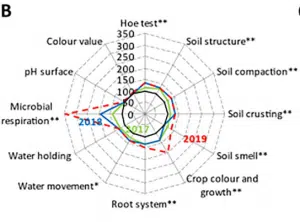
Radar plots of soil qualitative and quantitative measures over two years after plots received 2 – 7 yrs prior to management change. Solvita is the microbial respiration protocol, showing observable and statistically significant sensitivity to soil effects.
A new study conducted in Africa evaluates Solvita vs other soil health tests for assessing the reversal of soil degradation. Paired fields in Ethiopia (23 farms), Kenya (23 farms), and Tanzania (13 farms) were assessed by a participatory approach where farmers and field technicians collected data on soil parameters. Fields in each comparison had validated practices in a range of 2 – 7 years. The Basal Solvita (undisturbed non-lab processed soil) was employed since it most reflects real, and not lab-artifact results for soil respiration. The researchers compared quantitative data to changes in soil color and aroma and plant growth and root-quality characteristics. The researchers found that ” Solvita microbial respiration was interestingly very consistent throughout the study, with higher levels observed for CA in all three regions in the last 2 years of the study”. In Tanzania, a lower response of soils to Conservation methods was speculated to be related to the sand or loamy sand texture of the soils.
Overall the study provides a rich variety of results and builds on-farm participatory approaches that stress indigenous farmer knowledge in the assessment of new practices. It also reveals the great applicability of the Solvita semi-portable, field kit (basal) process which provides visual and quantifiable results specifically avoiding lab soil-handling which causes artifacts. The Solvita tests are easily performed by field workers with suitable methodological oversight. [ The study is found at ASD (https://doi.org/10.1007/s13593-022-00824-1) ].

